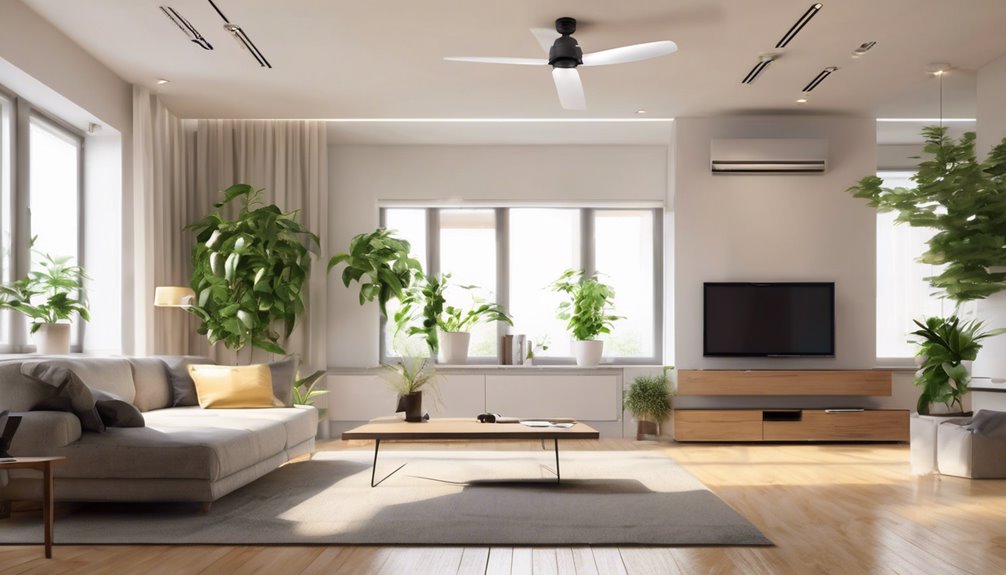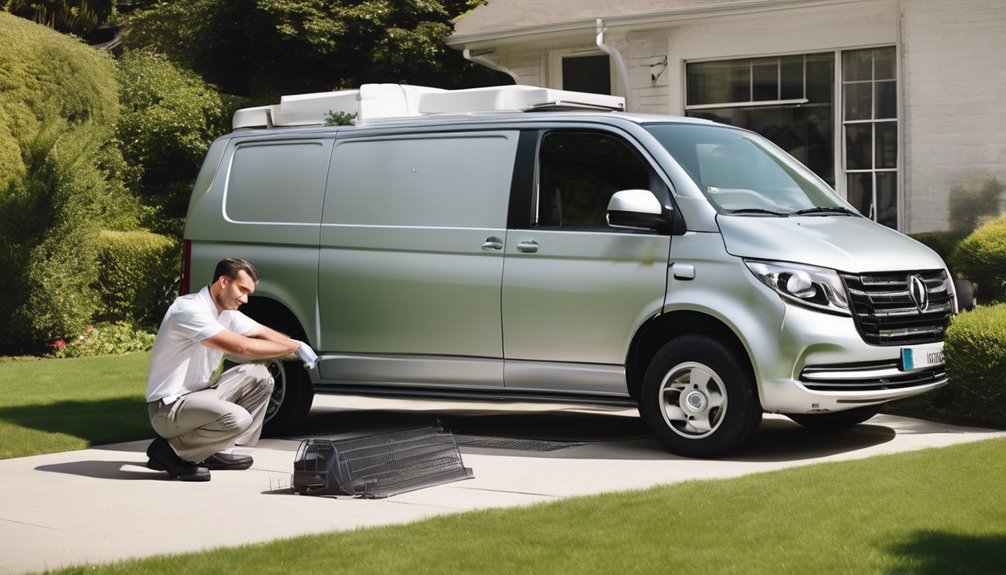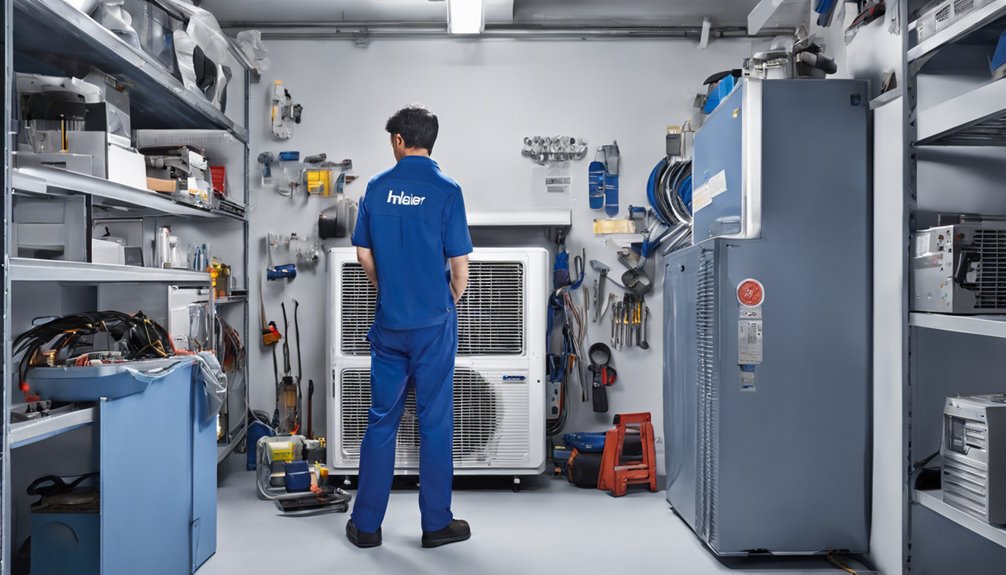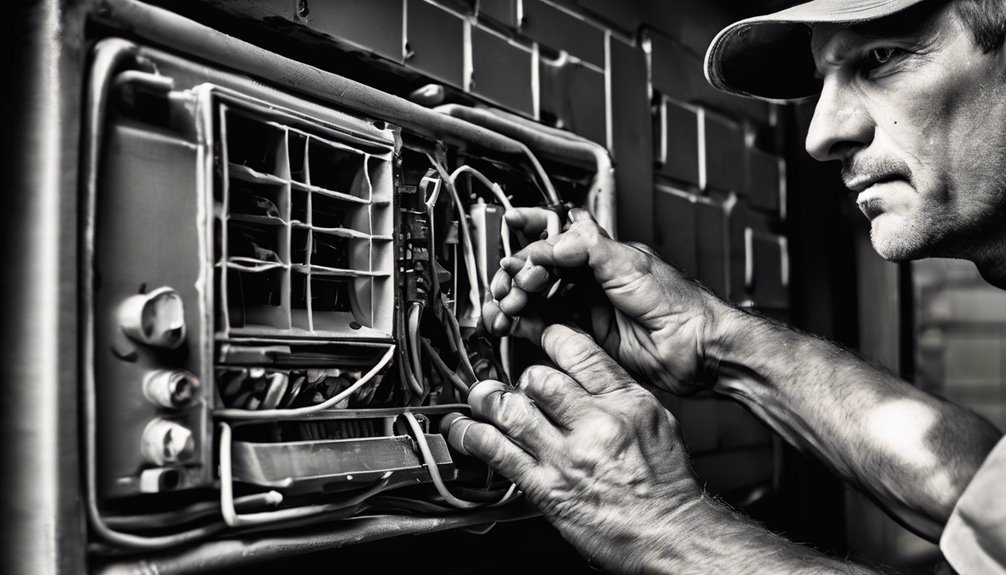To cut your electricity bills in half, start by optimizing your AC's settings and scheduling. Set your thermostat to 20 degrees, use summer modes, and schedule cooling to match your daily routine. Ensure effective air circulation by maintaining ventilation systems and unblocking air pathways. Regularly replace air filters, clean coils, and inspect seals to keep your AC running efficiently. By following these tips, you'll be well on your way to reducing your electricity bills – and there's even more you can do to stay cool and save energy.
Key Takeaways
- Set the thermostat to 20 degrees for efficient cooling and maintain a consistent temperature throughout the day to avoid temperature swings.
- Schedule cooling to coincide with daily routines and take advantage of off-peak hours when electricity rates are lower.
- Ensure effective air circulation by maintaining ventilation systems and unblocking air pathways to reduce energy consumption.
- Replace the air filter every 1-2 months and clean the coils regularly to improve airflow and heat transfer.
- Seal air leaks around windows, doors, and ducts to prevent cooled air from escaping and reduce energy waste.
Optimizing Your AC's Settings
When the temperature rises, your air conditioner becomes your best friend.
To get the most out of it, optimize its settings for maximum comfort and efficiency.
Optimize your air conditioner's settings to maximize comfort and efficiency, ensuring a cooler and more cost-effective summer.
Adjust the fan direction to circulate cool air more effectively. You can set it to "auto" to let the AC decide the best direction or manually adjust it to blow air upwards, which can help reduce temperature swings.
Speaking of temperature swings, try to maintain a consistent temperature throughout the day.
Avoid drastic changes, as this can put extra strain on your AC and increase energy consumption.
Scheduling Your Cooling
You can maximize your AC's efficiency by scheduling your cooling to coincide with your daily routine.
Consider setting cooling hour windows to match your wake and sleep schedules, so you're not wasting energy when you're not home or when you're sleeping.
Cooling Hour Windows
Scheduling your cooling during specific hour windows can significantly impact your energy consumption.
By doing so, you can reduce your summer cooling costs and still enjoy a comfortable temperature.
Here's how to make the most of your cooling hour windows:
- Morning chill: Run your AC during the early morning hours when the outside temperature is still cool. This helps to cool your home before the heat sets in.
- Take advantage of off-peak hours when electricity rates are lower, usually between 8 pm and 7 am.
- Pre-cool your home before a heatwave by running your AC at a lower temperature a day or two before the heat sets in.
Smart Thermostat Settings
By optimizing your cooling schedule, you can take your energy savings to the next level.
Smart thermostats let you create schedules that fit your lifestyle. During summer modes, you can set your AC to run at higher temperatures when you're not home or sleeping.
Geofencing rules can also be set up to detect when you're away from home and adjust the temperature accordingly. You can program your thermostat to cool your home to a comfortable temperature just before you arrive.
Cooling Your Space Efficiently
You're probably aware that cooling your space efficiently is crucial to keeping your energy bills in check.
To achieve this, you'll want to focus on three key areas: getting your thermostat settings just right, ensuring effective air circulation, and using shade to keep the sun's rays from heating up your windows.
Proper Thermostat Settings
Twenty degrees is the magic number when it comes to thermostat settings for efficient cooling.
This temperature allows you to stay comfortable while minimizing your electricity bill.
However, you can fine-tune your thermostat settings to optimize your AC's performance.
1. Use summer modes****: Many modern ACs come with summer modes that optimize cooling while reducing energy consumption.
Make sure to activate this feature during the hottest months.
2. Install zoning systems****: Zoning systems allow you to cool specific areas of your home, reducing energy waste and saving you money.
3. Program your thermostat: Program your thermostat to adjust the temperature when you're not home or when you're sleeping to avoid unnecessary cooling.
Effective Air Circulation
Proper air circulation is key to cooling your space efficiently, and it starts with a well-maintained AC system.
You'll want to ensure that your ventilation systems are functioning correctly and that air pathways aren't blocked. Check for any obstructions, like furniture or curtains, that might be restricting airflow.
Move items away from vents and make sure they're not covered. This will allow cooled air to circulate freely, reducing the load on your AC.
Shade for Windows
By improving air circulation, you've taken a significant step towards cooling your space more efficiently.
Now, it's time to tackle another crucial aspect: shade for windows.
Direct sunlight can significantly heat up your room, making your AC work harder.
To combat this, consider the following:
- Install window treatments: Close curtains, blinds, or shades during the hottest parts of the day to block out direct sunlight.
- Use outdoor awnings: These can reduce solar heat gain by up to 77%, keeping your room cooler.
- Plant trees or shrubs: Strategically placing greenery outside your windows can provide natural shade and reduce heat gain.
Maximizing Air Circulation
Maximizing air circulation in your home is crucial to ensuring your air conditioner operates efficiently and effectively.
When air circulates freely, your AC doesn't have to work as hard to cool your space, which means lower electricity bills for you. Identify and remove air flow blockers like clutter, curtains, and rugs that obstruct airflow.
Then, use ceiling fan tricks to your advantage. Run your ceiling fan in a counterclockwise direction during summer to push cool air down, making your AC more efficient.
Maintaining Your Air Conditioner
You've taken the first step to a more efficient AC by maximizing air circulation, now it's time to focus on the heart of the matter: your air conditioner itself.
A well-maintained AC is crucial to reducing electricity bills.
- Replace the air filter every 1-2 months to ensure clean air circulation and prevent dust buildup.
- Clean the coils regularly to improve airflow and heat transfer.
- Schedule annual professional maintenance to identify and fix potential issues before they escalate into costly problems.
Sealing the Deal on Savings
Proper insulation and sealing are essential to preventing cooled air from escaping and hot air from seeping in.
You'll want to identify and seal any air leaks around windows, doors, and ducts. Check for insulation gaps in your attic, walls, and floors, and fill them with spray foam or caulk.
Don't forget to inspect your AC unit's seals and replace them if they're worn out. By sealing these gaps, you'll prevent cooled air from escaping, reducing the load on your AC and your electricity bills.
This simple step can make a significant difference in your energy consumption and savings. Take the time to seal the deal on savings and enjoy a cooler, more efficient home.
Smart Thermostat Hacks
By optimizing your AC usage, you've already taken a significant step towards reducing your energy bills.
Now, it's time to take it to the next level with smart thermostat hacks.
- Schedule your cooling: Program your thermostat to turn off or adjust the temperature when you're not home or sleeping. This can save you up to $150 per year.
- Integrate with energy monitoring: Connect your thermostat to energy monitoring systems to track your energy consumption in real-time. This helps you identify areas for improvement and optimize your cooling usage.
- Geofence your thermostat: Use geofencing technology to automatically adjust your thermostat based on your location. This ensures your AC isn't wasting energy when you're not around.
Cooling Without the AC
Natural ventilation and shading can be just as effective as air conditioning in keeping your home cool, and they're free! You can achieve this by opening windows on opposite sides of your home to create a cross breeze, which allows hot air to escape and cool air to enter. Additionally, consider installing window treatments like awnings, shutters, or solar screens to block direct sunlight and reduce heat gain.
| Technique | Benefits |
|---|---|
| Open windows on opposite sides | Creates cross breeze, reducing heat |
| Install window awnings | Blocks direct sunlight, reduces heat gain |
| Use solar screens | Filters sunlight, keeps home cool |
| Plant trees or install shutters | Provides shade, reduces heat gain |
Frequently Asked Questions
Can I Use a Ceiling Fan With My AC to Save Energy?
You can definitely use a ceiling fan with your AC to save energy! Run the fan in summer mode, counterclockwise, to circulate cool air, allowing you to raise your AC's thermostat and cut energy costs.
How Often Should I Clean My Ac's Air Filters?
You should clean your AC's air filters every 1-3 months, depending on usage and filter quality. Don't forget to replace them every 6-12 months for optimal performance and to prevent dust buildup, which can increase energy consumption and reduce filter efficiency.
Will a Programmable Thermostat Save Me Money?
You'll likely save money with a programmable thermostat, as it helps optimize energy efficiency by automating your cooling patterns, ensuring you don't waste energy when you're not home or sleeping, and adjusting temps to your schedule.
Can I Use a Dehumidifier to Reduce AC Usage?
You live in a humid climate, and that's making your AC work overtime. Running a dehumidifier alongside your AC can help, as it'll remove excess moisture, allowing your AC to cool more efficiently, and you'll save energy in the long run.
Do AC Maintenance Plans Really Make a Difference?
You're wondering if AC maintenance plans are worth it. Yes, they can make a significant difference! Regular tune-ups ensure your AC runs efficiently, leading to cost savings and improved energy efficiency, which can add up to big savings over time.
Conclusion
You've made it to the end of our AC usage tips! By now, you've learned how to optimize your AC's settings, schedule your cooling, cool your space efficiently, maximize air circulation, maintain your air conditioner, seal the deal on savings, and even use smart thermostat hacks. You've also discovered ways to cool without the AC. Put these tips into practice and watch your electricity bills plummet. With a little effort, you can stay cool and save big this summer!



